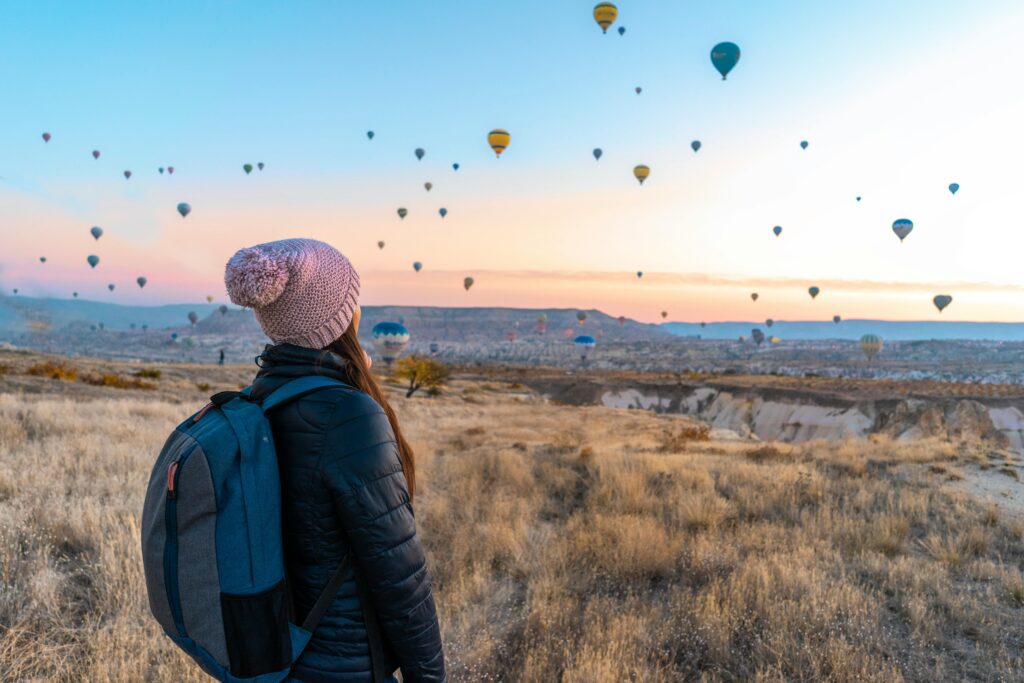The Minimalist Traveler: How Owning Less Leads to Richer, Deeper Travel Experiences

The Rise of Minimalist Travel
In an age where materialism often defines success, the minimalist lifestyle is gaining ground, and with it, a new approach to travel—minimalist travel. Instead of focusing on luxury accommodations, excess baggage, and packed itineraries, minimalist travelers aim to simplify their journeys by bringing only what’s essential and embracing the freedom of owning less. This shift reflects a growing desire for deeper, more meaningful experiences over the accumulation of stuff.
With minimalism reshaping how people live day-to-day, it has naturally extended into the realm of travel. The appeal of this lifestyle lies in the idea that by cutting down on possessions, travelers can immerse themselves more fully in the moment, free from the distractions of excess. As the saying goes, “less is more,” and when it comes to travel, carrying less can lead to more profound experiences—greater flexibility, fewer worries, and a stronger connection with the cultures and environments visited. Could owning less really lead to more rewarding adventures? The rise of minimalist travel suggests it’s possible.
The Philosophy of Minimalist Travel
At its core, minimalist travel is about shifting the focus from material possessions to experiences. The idea is simple: the less you carry, the more open you become to the richness of your surroundings. Minimalist travelers embrace the freedom that comes from detaching themselves from the need for excess. In doing so, they strip away unnecessary burdens and distractions, making room for more intentional, mindful experiences.
This philosophy prioritizes the present moment, enabling travelers to fully engage with the places they visit and the people they meet. When you aren’t preoccupied with managing too much stuff or worrying about over-packed itineraries, you naturally become more aware of the little details—the conversations with locals, the beauty of a sunset, or the unique energy of a city’s streets.
Minimalist travel isn’t just about packing fewer clothes; it’s about adopting a mindset of simplicity and intentionality. By choosing experiences over souvenirs, relationships over convenience, and moments over materials, travelers unlock a deeper level of immersion in the cultures they explore. This approach creates space for spontaneity and serendipity, allowing each journey to unfold in unexpected and fulfilling ways.
Real-Life Stories: Minimalist Travelers Who Have Mastered the Art
Many travelers have embraced minimalist travel, discovering that the less they carry, the more they gain from their journeys. Take Tom, a seasoned backpacker who spent six months exploring Southeast Asia with just a 20-liter backpack. For Tom, owning less wasn’t a challenge; it was liberating. “The less stuff I had to worry about, the more I could focus on the experience itself,” he said. His minimalist approach allowed him to travel light, moving effortlessly between countries, connecting with locals, and spending less time managing his belongings.
Then there’s Anna, a digital nomad who has spent years traveling the world with only the essentials. Anna stays in tiny homes or modest accommodations, prioritizing meaningful connections over material comforts. She has found that minimalism gives her the freedom to move from place to place without the hassle of dragging around unnecessary possessions. “When I stopped worrying about stuff, I became more open to meeting people and saying yes to new experiences,” she shared.
One couple, Lisa and Mark, have taken minimalism to heart by traveling in their camper van across Europe. Living out of a tiny space with only the essentials has strengthened their bond and deepened their cultural experiences. “We’re more present with each other and with the places we visit because we’re not distracted by what we don’t have,” says Lisa. These stories demonstrate that minimalist travel offers not only practical benefits but also the chance for personal growth and deeper cultural connections.
The Benefits of Traveling Light
Traveling light offers more than just convenience—it opens the door to a richer, more fulfilling travel experience. One of the greatest benefits of minimalist travel is reduced stress. When you carry fewer belongings, there’s less to manage and worry about, allowing you to focus more on your surroundings and experiences. Fewer bags mean less weight on your shoulders, physically and metaphorically, which leads to greater comfort and ease.
Packing light also promotes greater flexibility. Whether it’s hopping on an unexpected flight deal, taking a spontaneous detour, or fitting into a compact hostel space, minimalist travelers can adapt to changing plans without being bogged down by excess baggage. The ability to move freely allows for more spontaneity, making it easier to explore a destination without the limitations of heavy luggage or over-planned itineraries.
Beyond practicality, traveling light creates a sense of freedom. Without the burden of material possessions, travelers can immerse themselves more deeply in the local culture and environment. There’s less time spent organizing and protecting belongings, and more time available for truly experiencing the destination. This simplicity leads to more meaningful connections, less stress, and a stronger sense of presence. Minimalist travel helps you focus on what matters most: the moments, the people, and the memories you create along the way.
Tips for Embracing Minimalism While Traveling
Adopting a minimalist approach to travel doesn’t mean sacrificing comfort; it’s about maximizing experiences by reducing the clutter that often comes with travel. Here are some practical tips to embrace minimalism on your next journey:
- Pack Only the Essentials:
Start by packing versatile, multipurpose items that serve more than one function. Focus on a capsule wardrobe, consisting of neutral, lightweight clothing that can be mixed and matched. Instead of multiple pairs of shoes, bring one durable, comfortable pair that can be used for walking, hiking, or exploring. Limit toiletries to small, travel-sized versions, and consider solid alternatives, like shampoo bars, to save space. - Choose Accommodations Thoughtfully:
Consider staying in tiny homes, hostels, or local accommodations that prioritize simplicity and sustainability. These types of stays often offer a more immersive experience, allowing you to connect with your surroundings and the local culture in ways that large hotels or luxury resorts may not. These minimalist spaces help you focus on the essentials, fostering a deeper appreciation for the experience over material comforts. - Travel Slow and Live in the Moment:
Slow travel is all about savoring the journey rather than rushing from one tourist hotspot to the next. Take your time exploring a new place—stroll through local markets, enjoy leisurely meals, and engage with local customs. By spending more time in fewer places, you create space for more meaningful experiences and connections. This also reduces the pressure to “see it all,” allowing for a more relaxed, fulfilling adventure. - Focus on Meaningful Experiences:
Instead of buying souvenirs or indulging in luxury, prioritize meaningful experiences. Spend your time connecting with locals, learning their customs, and understanding the culture. Take part in local workshops, cooking classes, or guided nature tours to immerse yourself in the destination. These experiences stay with you longer than any material item. - Let Go of the Need for Perfection:
Travel is unpredictable, and embracing that unpredictability is key to minimalist travel. Instead of seeking perfect accommodations, flawless meals, or ideal transportation, enjoy the journey for what it is—an adventure full of surprises. Accept that not everything will go as planned, and you’ll find joy in the unexpected moments.
How Minimalist Travel Fosters Deeper Cultural Connections
Minimalist travelers often form more meaningful connections with the places they visit because they travel with intention and focus. By carrying fewer belongings, they remove the distractions that can prevent deep engagement with the local culture. Without the need to manage and protect excess baggage, minimalist travelers have the freedom to fully immerse themselves in their surroundings.
When you own less, you focus more on people and experiences rather than things. Minimalist travelers are more likely to engage in genuine conversations with locals, learn about their traditions, and participate in daily customs. Instead of being weighed down by the need to shop for souvenirs or over-plan activities, they are present in the moment—whether it’s enjoying a spontaneous conversation at a local café or attending a community festival.
Minimalism fosters a mindset of openness and curiosity, encouraging travelers to observe the subtleties of their environment. From appreciating local art to participating in cultural rituals, minimalist travelers prioritize engagement over consumption. This results in more authentic and memorable experiences, where the connections made are often far more enriching than any material comfort or luxury.
The Joy of Traveling Light and Living Fully
Minimalist travel offers a path to richer, more fulfilling experiences. By carrying less and focusing on what truly matters, travelers can embrace the freedom to explore without the burdens of material possessions. This approach encourages deeper cultural connections, greater flexibility, and a more intentional way of experiencing the world.
As you reflect on your own travel habits, consider adopting a minimalist mindset for your next journey. Could packing light, slowing down, and living in the moment open the door to a more meaningful adventure? By owning less, we not only lighten our load but also create space for the experiences, connections, and memories that make travel truly special. Embrace minimalism and discover the joy of traveling light and living fully.

